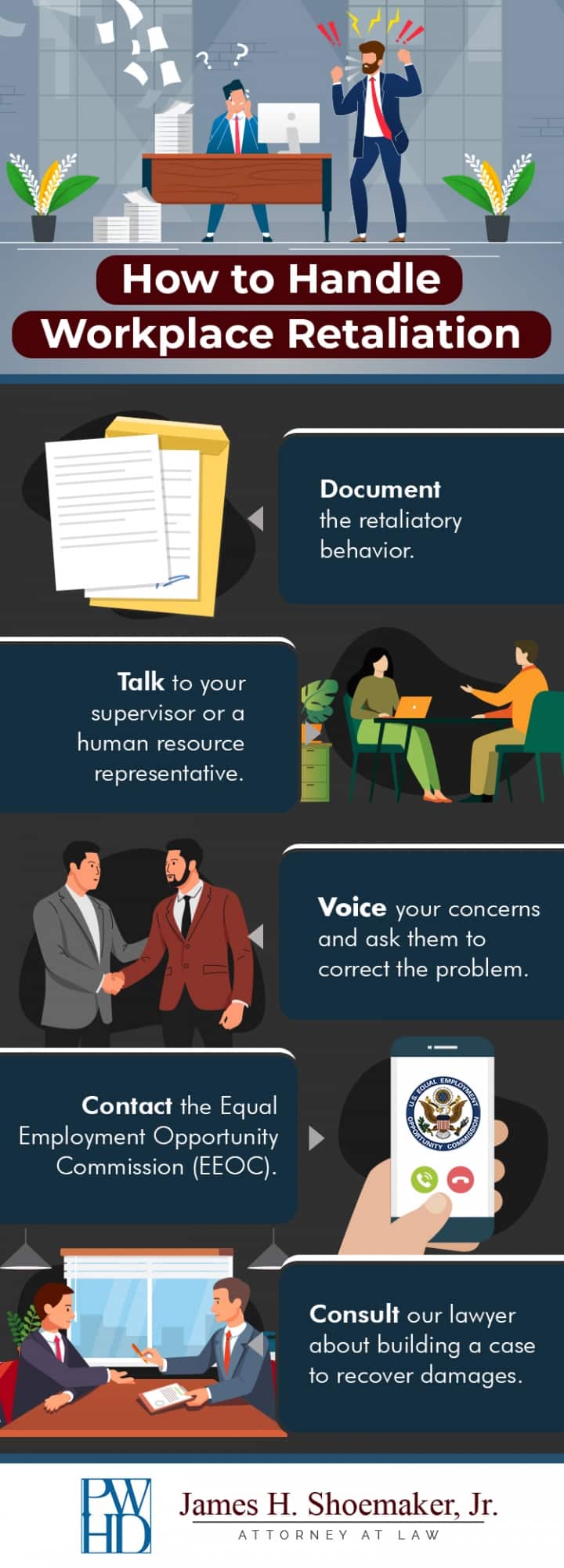Serving Clients in Virginia Beach, Hampton Roads, Washington D.C. & Throughout the U.S.
Over the last several decades, the federal government (as well as many state and local entities) have determined that the state has a vital interest in both incentivizing employees to report unethical behavior and to protect them from retaliation for doing so.
Much of attorney James Shoemaker's employment law work is concerned with protecting employees who engage in protected activities and suffer retaliation for it. Mr. Shoemaker is committed to ensuring that you are allowed to work and earn a living after doing the right thing.
With his decades of experience advocating for workers and their rights, Mr. Shoemaker is the right choice when you need legal expertise.
If you're looking for an experienced workplace retaliation lawyer in the state of Virginia, please call Mr. Shoemaker today at 757.223.4560.
Why Would I Suffer Retaliation?
When we talk about "engaging in protected activities," we mainly refer to employees reporting unethical behavior or trying to defend their rights – financial and otherwise. These actions are protected by federal law; you cannot be punished by your employer because you engaged in one of these activities.
Employees often suffer retribution for:
- Whistleblowing
- Reporting violations of the Family and Medical Leave Act or the Sarbanes-Oxley Act
- Reporting sexual harassment or employment discrimination
The most common form of retaliation is firing an employee, and you can learn more on this topic at our Wrongful Discharge page. But there are other forms of retaliation that some companies will inflict on employees, including:
- Demotions
- Pay cuts
- Suspensions
- Loss of hours
- Placing the most unpleasant work responsibilities on the employee's shoulders
How to Handle Workplace Retaliation
Workplace retaliation often leaves victims feeling overwhelmed and powerless. It's important to remember that you have access to resources that can make things right. With the help of our employment attorney, you can take matters into your own hands. Here are some tips for handling workplace retaliation.

How Do You Win a Retaliation Lawsuit?
To win a retaliation lawsuit against your employer, you will need to prove three things: One, that you filed a complaint or engaged in another legally protected activity; two, that negative action was taken against you that caused you harm; and three, that there was a link between these events. If these steps seem overwhelming, it is best to contact our attorney. Mr. Shoemaker has represented many clients in successful retaliation lawsuits. He has fought against large corporate employers and recovered six- and seven-figure settlements. He has even obtained recoveries without having to file suit. Talk to him about the merits of your retaliation case today.
What Laws Protect Employees Against Retaliation?
Most laws that give workers basic rights also protect workers who assert those rights. You will find that there are quite a few federal and state laws that prohibit employers from retaliating against employees who engage in protected activities. These laws include:
- Title VII
- The Fair Labor Standards Act
- State wage and hour laws
- The Occupational Safety and Health Act (OSHA)
- The National Labor Relations Act
- The Family and Medical Leave Act (FMLA)
If your workplace rights were violated and you complained to your employer, filed a complaint with an administrative agency, or filed a lawsuit, you are likely protected from retaliation. Contact our workplace retaliation lawyer to learn about the laws that apply to your specific situation.
Is Retaliation Hard To Prove?
Some things in business are unfair, and other things are illegal. Drawing the line between the two categories and proving that illegal retaliation occurred can be the most difficult aspect of these cases. That is why you will need evidence to support your claim. You can gather evidence by documenting the allegedly retaliatory behavior. You may also be able to use emails, performance reviews, and other documents to show that you were in good standing at work before you filed a complaint. And remember that when it comes to proving retaliation, hiring a skilled attorney such as Mr. Shoemaker can make the difference between a successful outcome and an unsuccessful one.
Can I Be Fired for Making a Complaint to HR?
You cannot be fired for making a complaint to HR about harassment, discrimination, health and safety violations, failure to pay overtime, or other legally protected matters. That is true even if your claim turned out to be unfounded — as long as you made it in good faith. Keep in mind that not every complaint is protected for retaliation purposes. Making a so-called frivolous complaint is not a protected activity. Our attorney can explain your legal rights in regards to the specific complaint you made to human resources.
What Constitutes Adverse Employment Action?

- Assigning you more work than your co-workers
- Reducing your pay
- Taking away your supervisory duties
- Not inviting you to team lunches or meetings
- Relocating you to a less desirable job site
- Moving you to a different shift that does not work with your schedule
How Do You Know If Your Employer Is Retaliating Against You?
Sometimes it is obvious that your employer is retaliating against you. Let’s say that you file a complaint about racial discrimination. Shortly after, you get fired for “poor quality work” despite your history of positive performance reviews. You would have good reason to suspect retaliation. Other times, retaliation is not so cut and dry. It may come in the form of an undesirable reassignment, denial of a leave request, or a sudden exclusion from team meetings. Our attorney can help you recognize workplace retaliation and stand up for your rights.
Contact our Attorney for Help with Your Claim
It can be difficult to prove retaliation – it's not enough to point to a demotion or suspension. You must prove that you were engaged in a protected activity that the management decision in question was retaliation for that action.
Mr. Shoemaker and the experienced staff at Patten, Wornom, Hatten & Diamonstein know how to successfully pursue these claims. We will listen to your story, take it seriously, advise you on the best course of action and, if we take the case, vigorously pursue the compensation to which you are entitled.
Many people are reluctant to do anything about workplace retaliation. They don't want to risk their jobs, their only source of income. But you don't have to just accept retaliation. You have legal protections, and you should take advantage of them.
If you need to speak with an experienced employment lawyer about your legal options as the victim of workplace retaliation, please call Mr. Shoemaker today at 757.223.4560
or contact him online to schedule your legal consultation.
